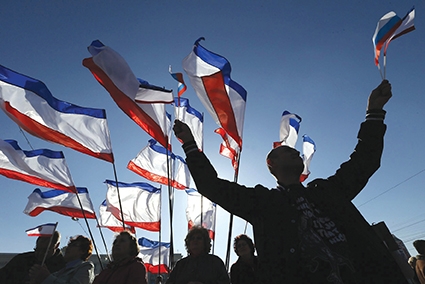Russia’s “Soft Power” in Action, with Full-Pledge Operational Scope
Georgia is preparing for forthcoming parliamentary elections, which will prove to be very critical to further development of the whole nation. These elections are dominated by discussions on foreign policy matters – just as in the Europe we are so craving to be a part of, the Parliament of Georgia has a final say on formulating decisions on foreign and defense policy issues. Hence, the “battle for parliament” has already turned into a melee, with parties trying to get as much leverage (in the form of seats, mostly) in their hands as possible, as it will be exactly parliament and not government that will decide in which direction the country ought to go.
One of the major battles the new parliament will get in its allegorical hands (and will be expected to muck out a jolly good show of) is countering clearly expressed Pro-Russian sentiments, a rather persistent practice which seems to have found a foothold of late. Unfortunately even the tragic events of the August 2008 war between Russia and Georgia weren’t enough to prevent this from happening and the Kremlin narrative is still powerful enough to attract about 20-25 percent of the population (according to the recent NDI research poll survey). So, what is happening and why is the Kremlin geopolitical agenda becoming attractive to a sizable (and as much as I do hope that this percentage will see a sharp downfall come next parliament, so far it has proven itself to be incredibly resilient, especially in the regions) minority?
Besides the geopolitical shifts at global and regional levels, the Russian incumbent policy-makers are picking up new methods and skills to promote their information warfare in those areas considered being of geostrategic importance for hegemony. Certainly, Georgia is thought to be one such area from the viewpoint of the current Kremlin leadership. When talking about the information warfare or, more precisely, about “network-centric warfare,” which Russia has comfortably channeled into a “soft power,” it is important to outline that the warfare is borne of the new generation of battle field strategy – called the “fourth warfare generation dimension,” the final goal of which is to destroy your opponent’s cultural values and subvert its political will for resistance.
Since the 2008 Georgia-Russia August war, the Russian incumbent policy-makers reconsidered their adherence to solely “Hard Power” capabilities and reinforced their own strategies, introducing the Russian version of a “Soft Power” strategy based on several unique leverages and components: mass-media monopoly, aggressive propaganda campaign, “historic memory” invocation or political mythology, modern communication technologies (cyber-warfare), network-centric dominance (social network and social media), ideological imperatives, cultural warfare/antagonism and ideological confrontation (such as aggressive anti-American rhetoric). Kremlin’s “Soft Power” strategy has become more and more elaborate since 2010 and has so far secured some important “victories” in its quest to farcically present itself as a counterweight to all things Western:
Setting up and further promulgation of geopolitical media project: “Russia Today” (now just RT), to dominate and compete with American CNN on a global scale;
Setting up and promotion of military TV channel: “ZVEZDA,” which reaches an impressive numbers of viewers in the Post-Soviet space;
Introduction of Russian originated social media projects: ODNOKLASNIKI, VKontakte, etc.;
Creation and launching of an American style – “SKOLKOVO” ultramodern technology development center project;
Setting up and running FSB-initiated (Russian analogy of Soviet KGB) special hacker-team “YASTREB” to strike down and infiltrate Western communication systems (mainly USA military structures).
As for Georgia, the Kremlin “visionaries” have launched a strategy consonant with the abovementioned formula. For instance, the contemporary Russian “Soft Power” policy towards Georgia on the eve of the parliamentary elections can be grounded into several concrete directions and components:
1) Very open and aggressive “pro-Russian” narrative: legitimization of Russian military bases in Georgian occupied territories, granted dual citizenship status to Georgians residing abroad (main target group is obviously people working in the Russian Federation – these proposals stemming from a very pro-Russian oriented political party “Centrists” (Temur Khachishvili- infamous Vladimir Bedukadze of Gldani prison fame);
2) A foreign policy of non-alignment and neutrality, creating a false sense of security if Georgia abandons its path to the West;
3) Lately re-emerged on screen, the so-called “Socialist Georgia” public-political movement (Stalin aficionados Grisha Oniani and Temur Pipia) which relies on: political mythology and an aggressive propaganda campaign.
All three are linked with the most coveted objective of Russia’s soft power agenda: aggressive Anti-American rhetoric and propaganda and an even deeper “strategic encroachment” of Georgia.
Vakhtang Maisaia












